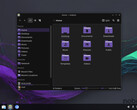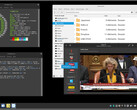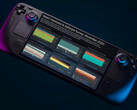After working long and hard, poking and prodding at the Apple silicon ARM hardware, the developers of the Asahi Linux project have announced the official release of the flagship Fedora Asahi Remix, which supports MacBooks and Apple computers.
Fedora Asahi Remix ships with KDE Plasma by default — although GNOME 45 is also available — offering a highly customisable desktop experience. It also adds support for OpenGL 3.3, 4.x, and Vulkan. Fedora Asahi Remix is 100% Wayland-based, with X11 apps handled by Xwayland. Wayland enables Asahi to implement features like VRR and will help bring an HDR desktop experience further down the line.
The macOS alternative supports the Apple M1 and M2 MacBook, Mac Mini, Mac Studio, and iMac devices. Fedora Asahi Remix can be installed by running a simple script — found on the project's homepage — from within macOS.
Caveat emptor, though, because there are a number of Apple devices that still need the kinks worked out, like the lack of Touch ID, microphone, and USB-C display, Thunderbolt, and USB4 support on M1 and M2 MacBook Air devices.
To address the support question, the Fedora Asahi Remix page has a compatibility tool that lists what is and isn't working for each device. At the moment, the MacBook Air seems to have the most broken features, while the Mac Mini and Mac Studio seem to have the best support, with only USB-C displays, Thunderbolt, and USB4 support missing.
As the project matures, the issues with these missing features will almost certainly be worked out. You can follow along with feature development from the Fedora Asahi Remix homepage or the Asahi Linux blog.
What's more, the Asahi Linux team claims it worked with PipeWire and WirePlumber developers in order to improve sound processing and deliver the "world's first fully-integrated DSP solution for the desktop Linux ecosystem." The reworked audio system promises low latency, full loudness, and improved dynamic range. Asahi Linux seems to be just as capable of audio processing as macOS is, addressing common audio complaints from Linux users that do sound engineering or music production on their laptops.
Users that tested earlier builds of the Arch-based Asahi Linux had mostly positive things to say, citing a surprisingly stable experience and impressive battery life, but since the Fedora Asahi Remix is so new, in-depth testing will likely appear online within the next few weeks to give us an idea of what to expect from the build.
Buy an Apple 2022 MacBook Pro 13 with M2 chip on Amazon, or grab a Steam Deck, which runs a derivative of Arch Linux, from Amazon.
I tried Asahi Linux and have some thoughts...
byu/youzhang inAsahiLinux




















